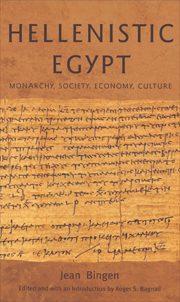Book contents
- Frontmatter
- Contents
- Original Sources of Chapters
- List of illustrations
- Glossary
- Maps
- Foreword
- Introduction: Jean Bingen and the currents of Ptolemaic history
- Part I The Monarchy
- Part II The Greeks
- Part III The Royal Economy
- Part IV Greeks and Egyptians
- 16 Greek economy and Egyptian society in the third century
- 17 Greeks and Egyptians according to PSI V 502
- 18 Graeco-Roman Egypt and the question of cultural interactions
- 19 Normality and distinctiveness in the epigraphy of Greek and Roman Egypt
- Conclusion
- Bibliography
- General index
- Index of passages discussed
- HELLENISTIC CULTURE AND SOCIETY
16 - Greek economy and Egyptian society in the third century
from Part IV - Greeks and Egyptians
- Frontmatter
- Contents
- Original Sources of Chapters
- List of illustrations
- Glossary
- Maps
- Foreword
- Introduction: Jean Bingen and the currents of Ptolemaic history
- Part I The Monarchy
- Part II The Greeks
- Part III The Royal Economy
- Part IV Greeks and Egyptians
- 16 Greek economy and Egyptian society in the third century
- 17 Greeks and Egyptians according to PSI V 502
- 18 Graeco-Roman Egypt and the question of cultural interactions
- 19 Normality and distinctiveness in the epigraphy of Greek and Roman Egypt
- Conclusion
- Bibliography
- General index
- Index of passages discussed
- HELLENISTIC CULTURE AND SOCIETY
Summary
In 332, Alexander the Great conquered Egypt without difficulty. The Delta and even the Nile valley were well known to the Greeks, who had long traversed them as mercenaries or landed as merchants. Some permanent settlements, like the city of Naucratis or the Greek quarter of Memphis, certainly aided the Macedonian's invasion, along with no doubt the Egyptians' dislike of the common enemy, the Persians. When he set off again, Alexander left behind him both a Graeco-Macedonian army of occupation and a new city, Alexandria, which was destined to grow beyond all expectation – Alexandria, the city of Sarapis, which from the beginning and for a thousand years to come lived with a double destiny: Hellenism and the rule of Egypt. A generation or two later, Egypt had become a Macedonian kingdom in which Egyptians and Greeks lived with some other, less numerous ethnic groups.
One of the most interesting directions of papyrological research has been the study of the connections that we can discern in the Ptolemaic period between the dominant Greek minority and the Egyptian majority. Here we will try to set forth some of the consequences that the intrusion of new economic forms connected to the wide-spread Greek settlement in Egypt, particularly a monetised economy, had for various indigenous social groups.
- Type
- Chapter
- Information
- Hellenistic EgyptMonarchy, Society, Economy, Culture, pp. 215 - 228Publisher: Edinburgh University PressPrint publication year: 2007



